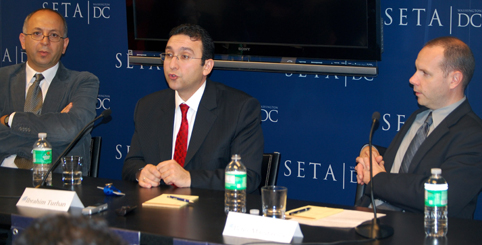On Sunday September 12th, 2010, Turkey voted "yes" in a referendum to a package of amendments by a wide margin (58 percent yes; 42 percent no) with a high level of participation (77.5 percent) despite the pro-Kurdish Peace and Democracy Party's (BDP) boycott. The amendments were designed to restrict the power of the military and the judicial bureaucracy in Turkey that originated from the 1982 junta-made Turkish constitution. The immediate political consequence of the referendum will be a serious relaxation of domestic political tensions, which have been undergirded for over 50 years by the one constant in Turkish politics: the ever present threat of military coup.
Referendum results will affect Turkish domestic politics and Turkish foreign policy in fundamental ways. Domestically, the results will bolster democratic reforms by preventing the judicial bureaucracy's ability to play an obstructionist role. Moreover, the referendum was a de facto conditional vote of confidence for the ruling AK Party's foreign policy given the recent difficult months Turkish foreign policy has had to face. The results will be interpreted as moral and political support for the government's "zero-problem with neighbors" policy.
The referendum ultimately has to be viewed within the lens of Turkey's long battle against military rule. Indeed, modern Republican Turkish history is rife with successful military coups, including those in 1960, 1971, and 1980 (it was the latter coup which gave birth to the current constitution). Add to these the so-called "post-modern coup" of 1997 and the failed "e-coup" attempt in 2007, and one begins to understand that the possibility of a coup d'etat has been the specter of Turkish politics, laying in wait behind the scene and haunting political figures for decades. With the passage of the new constitutional amendments, the rule of law will have to be respected by all members of Turkish society, including the military.
Of singular importance to a democratic Turkey is the ability to now carry forth with a reckoning of its past through the full range of the law (i.e. trials) -- something that was impossible with the hitherto assured immunity for those who enacted the 1980 coup. A dark chapter in Turkish history can now be closed and a brighter more democratic future awaits it. In the long-run, the strength of Turkey's political institutions and the latitude of Turkey's civilian leaders to legislate and govern will be increased.
Turkish Prime Minister Tayyip Erdogan's track record for dealing with the pressure of military elites shows that a strong civilian political leader can do away with the threat of a coup. However, with this vote, the strength of political leadership vis-à-vis the traditional state elites will not be restricted to Erdogan's personal charisma. Instead, by eliminating the supremacy of military and civilian bureaucratic power over Turkish domestic and foreign policy, these amendments will give legal and structural guarantees to political figures, transforming Erdogan's personal success against state elites into an institutional characteristic of the Turkish political system.
The next step is the establishment of a new democratic constitution as promised by Erdogan. Up until now, substantive changes in the constitution have not been possible because of the highly politicized structure of the Constitutional Court. By changing the structure of the Constitutional Court, Sunday's vote will allow Turks to draft a new constitution after the 2011 elections. Sunday's vote paves the way for (if not guarantees) a civilian constitution in Turkey for the first time in 50 years.
A crucial, but often neglected, aspect of the constitutional debate has been the use of the referendum itself -- which has proven to be an important vehicle for structural democratic change in the Turkish political system under Erdogan's guidance. Back in 2007, after the e-memorandum by the military, which aimed to prevent then-Foreign Minister Abdullah Gul from acceding to t








